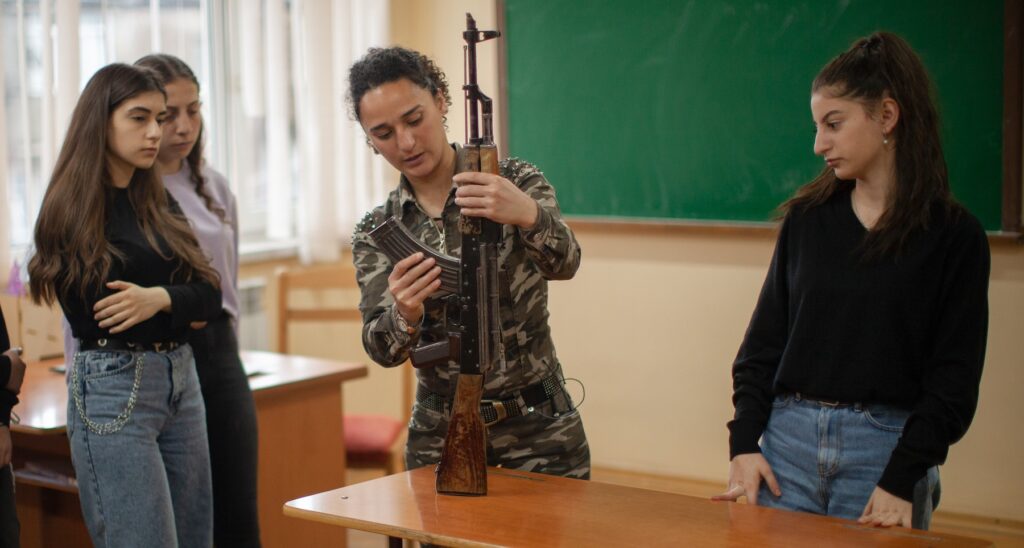Never Heard of Artsakh? ‘There Was, There Was Not’ Offers a Good Chance To Learn About the Troubled Former Soviet Region
The director, who set out to highlight the lives of women in a culture dominated by men, notes that she ‘never meant to make a film that documented war, displacement, and ethnic cleansing.’

“This story is about four women whose lives are connected by a home they all love deeply”: So begins the introductory narration to Emily Mkrtichian’s documentary, “There Was, There Was Not.” The picture is having its New York City theatrical premiere on November 18 as part of Doc NYC 2024; it will be available for streaming the day after on the organization’s website.
As the voiceover continues, we watch the women with their families, at leisure and in a series of idyllic settings. They “live in a place called Artsakh,” Ms. Mkrtichian tells us, “… a place that no longer exists.”
Never heard of Artsakh? Commonly referred to as Nagorno-Karabakh, this mountainous region in the South Caucasus has a troubled history reaching back some five centuries before the birth of Christ. Once part of Armenia, Artsakh and its people have undergone subjugation by the Ottoman Empire, the whims of Joseph Stalin, and territorial encroachment by neighboring Azerbaijan. Like that country and Armenia, Artsakh was once part of the Soviet Union.
In 1988, Artsakh’s dominant ethnic group, the Armenians, petitioned the Kremlin to separate the region from Azerbaijan and reintegrate it within greater Armenia. The subsequent collapse of the Soviet Union did not prove the matter moot, but it did result in the independence of Armenia and Azerbaijan, with Artsakh claiming much the same. Although Armenia never formally recognized the breakaway republic, it provided military and economic support. All of which didn’t quell Azerbaijani ambitions.

This nutshell recapitulation of the area’s fractious history will give viewers an idea of the existential tenterhooks with which Ms. Mkrtichian’s subjects have lived the better part of their lives. The director notes that she “never meant to make a film that documented war, displacement, and ethnic cleansing.” Her attempt at highlighting the lives of women in a culture dominated by men became, through historical circumstances happening in real time, a document on long-standing begrudgeries and geographical domination.
The title phrase, “there was, there was not,” is the Armenian equivalent of “once upon a time.” Ms. Mkrtichian recounts the pivotal role myths and fairy tales played in her own upbringing: We watch as she leafs through the pages of well-worn children’s books. It’s worth reiterating that such stories often serve as cover for darker truths about human nature. Whatever romantic notions with which Ms. Mkrtichian began this venture were put to the test during the half decade it took to make the film.
Among the figures profiled in Ms. Mkrtichian’s picture are an Olympic athlete; a political operative; the head of a grassroots organization providing help for battered wives; and a 40-something mother of two, Sveta Harutunyan, who spends her days combing the countryside in the pursuit of landmines to disarm. Ms. Harutunyan is the most explicitly prole of our protagonists, but each of these women is resolute in demeanor and doesn’t suffer fools gladly, though they sometimes keep a tight lid on their frustrations.
With her elegant coiffure and on-the-money ensemble, Siranush Sargsyan seeks political office for a citizenry that is skeptical about her chances. Gayane Hambardzumyan is dogged in her ambition to achieve greater autonomy for women but has to contend with the reluctance of her charges and an ambivalent husband. The towering Sosé Balasanyan shows off the medals she’s earned as a world-class practitioner of Judo and, later, her skills in the proper handling of arms.
The last fact shouldn’t be a spoiler for those who keep track of international events: The Republic of Artsakh was dissolved into Azerbaijan on January 1 of this year, an act signed-off on by its then-president, Samvel Sergeyi Shahramanyan. Ms. Mkrtichian offers an elegy for a lost homeland that is also a study in human perseverance, a picture that is, in the end, more bitter than sweet. “Happily ever after” is a conclusion not applicable to all fairy tales.

